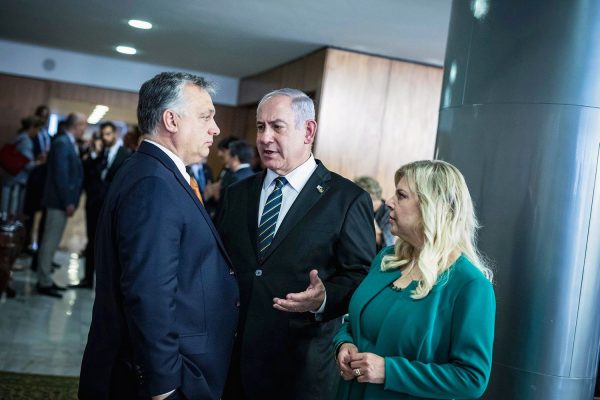
Israeli prime minister Benjamin Netanyahu saw the largest protests against him in nearly a decade on Saturday, when some 10,000 rallied outside his residence in Jerusalem and outside his private home in the coastal town of Caesarea.
The protesters are upset about Netanyahu’s handling of the outbreak of coronavirus in Israel and his remaining in power despite standing trial for corruption.
Similar demonstrations took place in Tel Aviv last month.
Violence
Netanyahu accused the protesters of “trampling on democracy” and the media of “one-sidedness”.
“They do not report the demonstrations. They participate in them,” he said of journalists.
He also claimed the demonstrations are inciting violence against him when in fact the demonstrators have been targeted by agitators. Police have arrested at least twenty far-right activists at protests in recent days.
Defense Minister Benny Gantz, a former army chief, has defended the protests, calling them the “lifeblood of democracy.”
“As a government, we have a responsibility to allow the demonstrations to take place and to protect the demonstrators,” he said.
Gantz leads the centrist Blue and White party. Netanyahu has been leader of the conservative Likud since 2005.
Coronavirus
Following a relatively mild first wave of COVID-19 in March, Netanyahu allowed houses of worship, markets, restaurants and stores to reopen in April and May. In late June and early July, the number of infections rose again, triggering the shuttering of nonessential businesses and reintroduction of social-distancing measures.
Netanyahu also appointed a coronavirus “czar”, Ronni Gamzu of the Tel Aviv Sourasky Medical Center, to coordinate the government’s response to the pandemic.
So far, the effect of the measures has been limited, with the number of confirmed coronavirus cases rising by as many as 2,000 per day in the last week.
Corruption
Dissatisfaction with Netanyahu’s handling of the pandemic comes on top of long-standing concerns about the high cost of living in Israel, which was behind major protests in 2011, as well as the prime minister’s corruption.
Netanyahu has been charged with accepting bribes and proposing to introduce legislation to hurt a friendly newspaper’s competitor in exchange for more favorable coverage.
Netanyahu claims the charges against him are politically motivated, that all the prosecutors and judges are left-wing, and he asked the Knesset, Israel’s parliament, for immunity. This went too far even for his erstwhile conservative ally Avigdor Lieberman and his coalition partner Gantz.
Elections
Gantz made a deal with Netanyahu in April to alternate in power, which caused seventeen of his 31 lawmakers to leave Blue and White and side with the opposition. Netanyahu previously reneged on deals with centrist and center-left parties in 2012 and 2014.
The prime minister recently warned he may call early elections if the Knesset doesn’t approve his proposed budget.
Netanyahu’s personal approval rating has fallen from 74 to 46 percent in one poll. Another puts it as low as 33 percent. Likud, which has 36 out of 120 seats in the Knesset, is polling at 31-34 seats. Blue and White is down from 33 to 9-12 seats. The centrists who left Gantz’s party, the left-wing Meretz and Naftali Bennett’s right-wing Yamina are up in the polls.
1.2 million Israelis, 14 percent of the population, receive some form of state aid. Disbursement of a €1.6 billion support program prioritizes parents with young children. Around 800,000 Israelis, one in five workers, are jobless.
